现代英语词汇学概论最强版复习chapter
现代英语词汇学概论chapter5
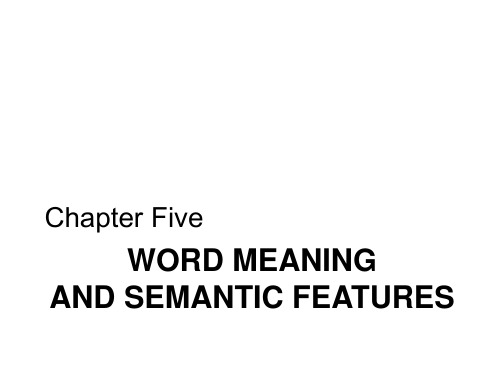
– bow-wow or woof-woof , miaow , baa-baa moo , roar, coo, hiss, hum , quack; 阿嚏! 布谷!boom, crack, clang , clash, bang, rumble
11
• Morphological motivation
-- Eric Partridge
7
Conventionality
Most English words are conventional, arbitrary symbols; there is no intrinsic relation between the sound-symbol and its sense/meaning. • Conventionality: the arbitrariness between a sound and its meaning. • Most words in any human language conventional. e.g. English house French mansion
词的理据(motivation)指的是事物和现象获得名称的依据,说明词 义与事物或现象的命名之间的关系。
9
• Motivation can arise in three major ways
– Phonetic motivation – Morphological motivation – Semantic motivation
现代英语词汇学概论最强版复习资料chapter10
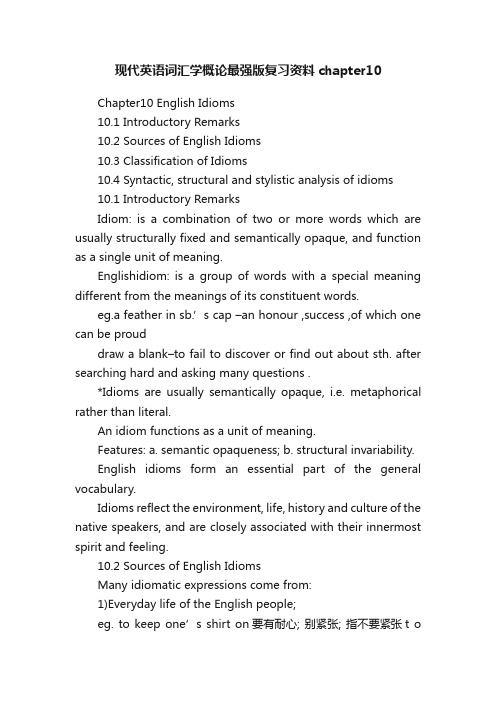
现代英语词汇学概论最强版复习资料chapter10Chapter10 English Idioms10.1 Introductory Remarks10.2 Sources of English Idioms10.3 Classification of Idioms10.4 Syntactic, structural and stylistic analysis of idioms10.1 Introductory RemarksIdiom: is a combination of two or more words which are usually structurally fixed and semantically opaque, and function as a single unit of meaning.Englishidiom: is a group of words with a special meaning different from the meanings of its constituent words.eg.a feather in sb.’s cap –an honour ,success ,of which one can be prouddraw a blank–to fail to discover or find out about sth. after searching hard and asking many questions .*Idioms are usually semantically opaque, i.e. metaphorical rather than literal.An idiom functions as a unit of meaning.Features: a. semantic opaqueness; b. structural invariability.English idioms form an essential part of the general vocabulary.Idioms reflect the environment, life, history and culture of the native speakers, and are closely associated with their innermost spirit and feeling.10.2 Sources of English IdiomsMany idiomatic expressions come from:1)Everyday life of the English people;eg. to keep one’s shirt on要有耐心; 别紧张; 指不要紧张t ogive sb. the cold shoulder冷落某人2)Agricultural life;eg. to go to seed花谢结子; 走下坡路; 花谢结籽to lead sb. up the garden path迷惑某人,使某人产生错觉,花言巧语3)Nautical and military life;eg. be in the same boat with同舟共济to be in deep waters陷入困境4)Business life;eg. to come under the hammer将要落锤to talk shop三句不离本行5)Student life;eg. to speak by the book引经据典to turn over a new leaf重新开始(改过自新,过新生活)6)Food and cooking;eg. to keep the pot boiling仅足糊口;苟延残喘to be in the soup陷入困境7)Sports and cad-playing;eg. to keep the ball rolling不使中断to reach first base取得初步成就8)The Bible;eg. a thorn in the flesh肉中刺,眼中钉,烦恼的根源to turn the other cheek忍气吞声t he apple of one’s eyes掌上明珠9)Shakespeare’s plays;eg. to flutter the dovecotes扰乱鸽棚to give the Devil his due 勿掩恶人善,平心而论10)fables, myths or legends.eg. sour grapes(指某人因得不到某物而称该事物不好)酸葡萄the lion’s share(最大份额或最大的一份)狮子的份额10.3 Classification of IdiomsThere are several criteria of classification of idioms. Weclassify them by structural criterion.A.Phrase idioms短语成语According to the central word , they may subdivided into:1. Verb phrase idiom*a) All common English verbs, most of which are of native Anglo-Saxon origin, can combine with adverbs and prepositions to form phrasal verbs.b) Most of the verb phrase idioms are often nearly synonymous with loan words of Roman origin.c) Verb phrase idioms can form noun compounds.d) Phrasal verbs usually more lively and expressive than single verbs.eg. fall flat大失所望; 残败bite the hand that feeds one以怨报德2. Noun phrase idiomThe commonest functions of noun phrase idioms:a) As the direct object of a clause;b) As the complement of a clause;c) As the object of a preposition.eg. a baker’s dozen 十三个Jack of all trades 万事通; 万金油3. Adjective phrase idiomThe commonest function of adjective phrase idioms is as complement of a clause. eg. high and mighty盛气凌人;趾高气扬wide of the mark毫不沾边4. Prepositional phrase idiomFunctions of prepositional phrase idioms are:a) As an adjunct modifying a verb; 附属修饰语b) As a complement;补语c) As a complement or adjunct;d) As a disjunct; 分离判断语,附加语e) As a connecting phrase.B. Clause idioms无主语从句成语Most of these idioms are terse, colloquial, vivid and changed with life.1. Verb + complement pattern2. Verb + direct object pattern3. Verb + direct object + complement pattern4. Verb + indirect object + direct object pattern5. Verb + direct object + adjunct patternC. Sentence idioms句子成语1. Proverbs;2. Typical conversational expressionseg. Upon my word! 我敢担保!Well begun is half done.半途而废Kill the goose that laid the golden egg.毁掉财路; 杀鸡取卵10.4 Syntactic, structural and stylistic analysis of idiomsA. syntactic function句法的功能1. The syntactic function of most phrase idioms usually corresponds with the central word or components.2. The syntactic function of some phrase idioms can vary.3. Prepositional phrase idioms have very diverse functions.4. noun + noun phrases have diverse functions.eg. He has a gift of the gab.(the ability to talk readily and easily )B. transformational restrictions 结构转换的限制性Transformation is a matter of structural change, and the change may be of various kinds.1. Some verb phrases may change word order.2. Some cannot change their word order.3. Some verb phrases may be passivized, but some can not.4. Most of the clause idioms cannot be put into the passive voice, while some of them can be used either way.5. The direct object usually does not undergo passive transformation; only the indirect object can be passivized.6. Some clause idioms may be made passive with a meaning quite different from what it had in the active form.C. Collocative restrictions 搭配限制1. Words collocate with idioms as the subjects, objects, predicates etc. of different types of phrase and clause idioms.2. Some idioms have a wide range of collocates while some have a limited choice.3. For some idioms, one has to consider which collocates will serve as adjuncts.D. Structural variability结构变化Idioms are structurally fixed, and as a rule one are not supposed to change any element in an idiomatic expression. But it is not unusual for writers to give a new twist to an old saying by making slight changes for rhetorical effect.Some ways of alteration in idioms:1. The replacement of one element by another without affecting the meaning of the whole.2. Insertion of one or more words into an idiomatic expression without changing its basic meaning.3. Deletion of one or more words, especially articles.E. Stylistic features文体特征1. Most idioms are stylistically neutral;2. But some of them belong to informal spoken English;3. Some idiom phrases are slangy.。
现代英语词汇学概论chapter2

3
2.1 Morphemes
• The morpheme is the smallest meaningful linguistic unit of language, not divisible or analyzable into smaller forms. • The morpheme denotes the smallest units or the minimum distinctive feature of some class of things. • A morpheme is also two-facet language unit which possesses both sound and meaning.
• • • • One morpheme: nation Two morphemes: nation-al Three morphemes: nation-al-ize Four morphemes: de-nation-al-ize
4
2.2 Allomorphs
An allomorph (词/语素变体)
SUMMARY
15
Review: about the morpheme
Give the English or Chinese for the following and explain.
博客 闪客 奇客/极客 维客 威客
blog flash geek wiki witkey
黑客/骇客 掘客 沃客 播客 搞客
– Affixes are forms that are attached to words or word elements to modify meaning or function.
现代英语词汇学概论复习(Chapter1-10)

Word:a minimum free form of a language. With a unity of sound and meaning (both lexical meaning and grammatical meaning),performing syntactic meaningCriteria of words: by origin (native—old English)( and loan language—borrowed English), by level of usage(common words,literary ,colloquial,slang and technical words);by notions(function and content words)Morpheme:smallest meaningful linguistic unit of language, not divisible or analyzable into smaller form. A morpheme is also two—facet language unit which possesses sound and meaning。
Classification of morphemes:Free morpheme:utter alone with meaning(a free morpheme is a word in traditional sense)man, read, writeBound morpheme: must appear with one other morpheme,u nkind, happily , receiveRoot:the basic unchangeable part of the word;convey the main lexical meaning of the word; Either free or bound(1)free roots:many roots are free morphemes, such asboy ,moon,walk(2)bound roots: derived from foreign sources。
现代英语词汇学概论chapter4

10
• Reduplication
– a minor type of word-formation by which a compound word is created by the repetition (1) of one word like go-go; (2) of two almost identical words with a change in the vowels such as pingpong; (3) of two almost identical words with a change in the initial consonants, as in willy-nilly. so-so bye-bye 天天 人人 来来 往往 一点点 冷冰冰 蹦蹦跳 点点 滴滴 zigzag dilly-dally hotch potch
12
• Miscellaneous
– Genuine coinage is rare Some new words are coined by analogy(类推或仿词) and contrast(对比), e.g.
– bird’s eye-view, fish’s eye-view, worm’s eye-view; sunrise, moonrise; spaceman, moon-man, etc.
– They come from all sources, from names of scientists, politicians and statesmen to trade marks, and place names香港脚
3
• Clipping(缩略)
– The process of clipping involves the deletion of one or more syllables from a word (usually a noun), which is also available in its full form.
现代英语词汇学概论最强版复习资料chapter6
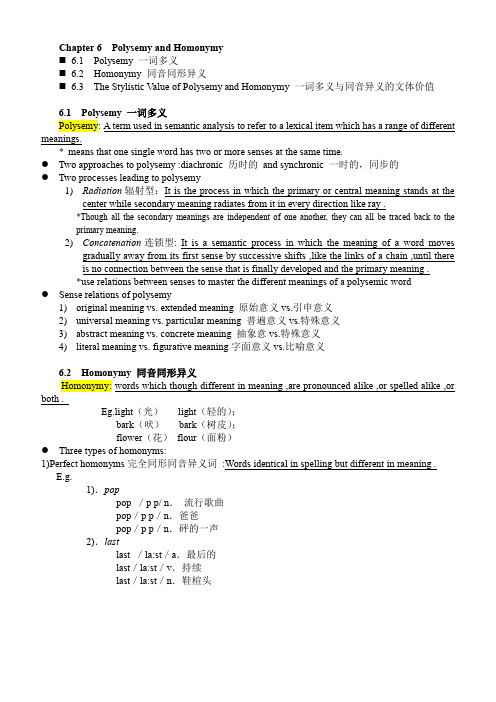
Chapter 6 Polysemy and Homonymy⏹6.1 Polysemy 一词多义⏹6.2 Homonymy 同音同形异义⏹6.3 The Stylistic Value of Polysemy and Homonymy 一词多义与同音异义的文体价值6.1 Polysemy 一词多义Polysemy: A term used in semantic analysis to refer to a lexical item which has a range of different meanings.*means that one single word has two or more senses at the same time.●Two approaches to polysemy :diachronic 历时的and synchronic 一时的,同步的●Two processes leading to polysemy1)Radiation辐射型:It is the process in which the primary or central meaning stands at thecenter while secondary meaning radiates from it in every direction like ray .*Though all the secondary meanings are independent of one another, they can all be traced back to the primary meaning.2)Concatenation连锁型: It is a semantic process in which the meaning of a word movesgradually away from its first sense by successive shifts ,like the links of a chain ,until thereis no connection between the sense that is finally developed and the primary meaning .*use relations between senses to master the different meanings of a polysemic word●Sense relations of polysemy1)original meaning vs. extended meaning 原始意义vs.引申意义2)universal meaning vs. particular meaning 普遍意义vs.特殊意义3)abstract meaning vs. concrete meaning 抽象意vs.特殊意义4)literal meaning vs. figurative meaning字面意义vs.比喻意义6.2 Homonymy 同音同形异义Homonymy: words which though different in meaning ,are pronounced alike ,or spelled alike ,or both .Eg.light(光)light(轻的);bark(吠)bark(树皮);flower(花)flour(面粉)●Three types of homonyms:1)Perfect homonyms完全同形同音异义词:Words identical in spelling but different in meaning .E.g.1).poppop /p p/ n.流行歌曲pop/p p/n.爸爸pop/p p/n.砰的一声2).lastlast /la:st/a.最后的last/la:st/v.持续last/la:st/n.鞋楦头现代英语词汇学概论最强版复习资料chapter62)Homophones同音异义词:Words identical in sound but different in spelling and meaning.Eg. air空气–heir继承人,后嗣bear忍受,熊–bare空的,赤裸的dear 亲爱的–deer鹿3)Homograph同形异音异义词:Words identical in spelling but different in sound and meaning .Eg. lead sow tear prayerSources of homonyms1.Phonetic convergenceUnder the influence of phonetic convergence ,two or more words whichonce were different in sound forms take on the same pronunciation thespoken language .E.g. melo –meal bean –been beat –beet flea –flee heal –heel2.Semantic divergenceWhen two or more meanings of the same word drift apart to such an extentthat there will be no obvious connection between them ,polysemy will giveplace to homonymy .E.g. flour –flower metal –mettle3.Foreign influenceE.g. host –one who entertains guest [L hospitis ]host –a large number ,an army [L hostis ,army ,hostile force ]4.ShorteningThis source is of decidedly subsidiary importance in formal writing but haswidespread influence in everyday speech.E.g. pop –popular (music )-to thrust ,to push (up ) 推6.3 The Stylistic Value of Polysemy and Homonymy一词多义与同音异义的文体价值Context plays a very important role in the hearer 's interpretation of words of two special types: different words of like form(homonymy)and words of several meanings (polysemy ).*Polysemic and homonymous words are stylistically useful to achievehumour or irony ,or to heighten dramatic effect .。
《现代英语词汇学概论》----解析(张韵斐)
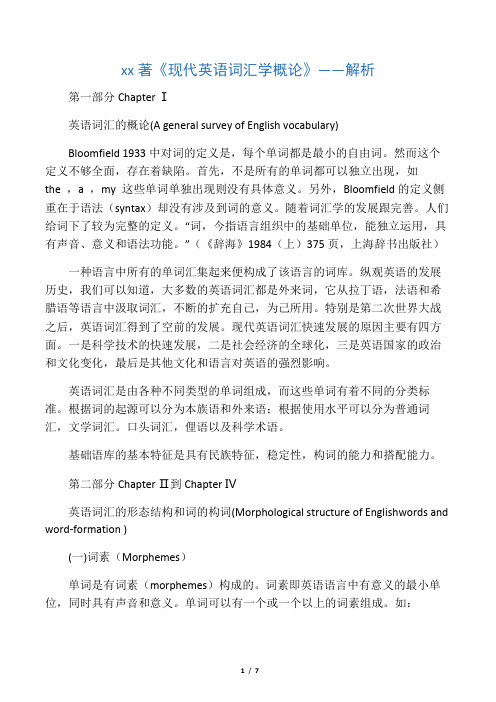
xx著《现代英语词汇学概论》——解析第一部分Chapter Ⅰ英语词汇的概论(A general survey of English vocabulary)Bloomfield 1933中对词的定义是,每个单词都是最小的自由词。
然而这个定义不够全面,存在着缺陷。
首先,不是所有的单词都可以独立出现,如the ,a ,my 这些单词单独出现则没有具体意义。
另外,Bloomfield的定义侧重在于语法(syntax)却没有涉及到词的意义。
随着词汇学的发展跟完善。
人们给词下了较为完整的定义。
“词,今指语言组织中的基础单位,能独立运用,具有声音、意义和语法功能。
”(《辞海》1984(上)375页,上海辞书出版社)一种语言中所有的单词汇集起来便构成了该语言的词库。
纵观英语的发展历史,我们可以知道,大多数的英语词汇都是外来词,它从拉丁语,法语和希腊语等语言中汲取词汇,不断的扩充自己,为己所用。
特别是第二次世界大战之后,英语词汇得到了空前的发展。
现代英语词汇快速发展的原因主要有四方面。
一是科学技术的快速发展,二是社会经济的全球化,三是英语国家的政治和文化变化,最后是其他文化和语言对英语的强烈影响。
英语词汇是由各种不同类型的单词组成,而这些单词有着不同的分类标准。
根据词的起源可以分为本族语和外来语;根据使用水平可以分为普通词汇,文学词汇。
口头词汇,俚语以及科学术语。
基础语库的基本特征是具有民族特征,稳定性,构词的能力和搭配能力。
第二部分Chapter Ⅱ到Chapter Ⅳ英语词汇的形态结构和词的构词(Morphological structure of Englishwords and word-formation )(一)词素(Morphemes)单词是有词素(morphemes)构成的。
词素即英语语言中有意义的最小单位,同时具有声音和意义。
单词可以有一个或一个以上的词素组成。
如:nation 是一个词素,national有nation+al 两个词素。
现代英语词汇学概论chapter1
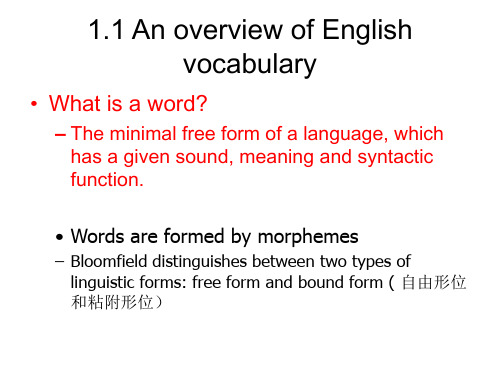
– By the end of the 13th century, English gradually came back into the schools, the law courts, and government and regained social status thanks to Wycliff translation of the Bible and the writings of Chaucer.
11
• In fact English has adopted words from almost every known language in the course of its historical development.
• As summed up in The Encyclopedia Americana: “…The English language has vast debts. In any dictionary some 80% of the entries are borrowed” English is supposed to have the most copious vocabulary of all the language in the world, estimated at more than a million words.
12
1.2.2 The growth of present-day English vocabulary
- 1、下载文档前请自行甄别文档内容的完整性,平台不提供额外的编辑、内容补充、找答案等附加服务。
- 2、"仅部分预览"的文档,不可在线预览部分如存在完整性等问题,可反馈申请退款(可完整预览的文档不适用该条件!)。
- 3、如文档侵犯您的权益,请联系客服反馈,我们会尽快为您处理(人工客服工作时间:9:00-18:30)。
Chapter 9 Changes in Word Meaning9.1 Causes of Changes in Word Meaning9.2 Four Tendencies in Semantic Change9.3 Semantic Development or Change Resulting from the Figurative Use ofWordsDefinition: Change of meaning refers to the alteration of the meaning of existing words, as well as the addition of new meaning to established words.9.1 Causes of Changes in Word MeaningA.Historical cause 历史原因It often happens that though a word retains its original form ,its meaning has changed because the object which it denotes has changed .*Changes of meaning because of increased knowledge of the object described are common in the history of science.Eg.pencil ==is from a Latin word meaning “a little tail” or “a fine brush”, like our Chinese “pen”毛笔.Later, when it was made of wood and graphite ,it was still called a “pencil”.atom ==It was borrowed though Latin and French from Greek arouos ,invisible. Thus atom meant originally “an particle too small to be divided”. This meaning is now out-of-date, because scientist have found out that atom can be split.B.Social cause 社会原因Change in word meaning resulting from a constant verbal traffic between common words and various technical words is referred to as socialcause of semantic change.Some technical words have lost their specialized meaning and have come to be used in more general senses.Eg.feedback(Electr.) =means “response”in common use ,as in “The teacher likes to have feedback from his students”;allergic (Med.)=means “being unusually sensitive to the action of particular foods, pollens, insect-bites ,etc.”*A specific environment may add a fresh and highly technical sense toa word of general use .Eg.energy =(Phys.) ability of matter or radiation to do workdecline =(Gram.) inflect, state the case-forms ofC.Foreign influences 外来文化影响A particularly important cause .eg.-pig ,sheep ,ox(cow)denote the names of both the animals and their meat in the Old English period ,but since the meat was called pork ,mutton and beef respectively among the Norman conquerors, the original terms are now used only as the names of the animals.-dream meant “joy” in OE, it gets its modern sense from the related Scandinavian word draumr.D.Linguistic cause 语言上的原因*Two tendencies: towards ellipsis省略and towards analogy类推.-Ellipsis as a cause of semantic change often occurs in habitual collocations, such as adj.+n.,or attributive n.+n.,in which the noun is often deleted and only the first element (the attributive )is left ,but retaining the sense of the whole phrase .eg.a general –a general officer 一位将军an editorial–an editorial article一篇社论bugle–bugle horn 号角gold–gold medal ,as in the Olympic Games金牌uniform–uniform dress 制服transistor–transistor radio 收音机daily–daily newspaper 日报duplicate –duplicate copy 副本-Analogical tendency: New meanings developed in one part of speech are passed on to other parts of speech from the same lexical base.eg.diplomatic (外交的,外交上的)which had earlier meant only “skillful in managing international relations,”had by 1826 developed the sense of “tactful in the management of relations of any kind ;artful management it dealing with others.”By 1848,this new meaning had been passed on to the noun diplomacy. (外交;外交手腕;交际手段)E.Psychological cause 心理学上的原因*Three formsa)Euphemism委婉People have a tendency to use mild, agreeable language when speakingof an unpleasant or embarrassing fact (such as death, disease, unfortunate events or crime), and of taboo subjects as sex and the excretive processes of the body.eg. hence death and things related to death-to pass away-to breathe one’s last -to cease to think-to fall asleep -to go west-to kick the bucket -to be no moreb)Grandiloquence 夸张Grandiloquence refers to the use of long, important-sounding words for effort .The desire to upgrade or raise the social status of a position, occupation, or institution by changing its common name to one felt to confer greater dignity or importance is another psychological factor in the change of word meaning.eg.janitor看门人;守卫;门警–custodian管理人;监护人;保管人gardener园丁;花匠;园艺家–landscape architect造园技师;环境美化设计家reform school教养院;少年犯管教所–community home少年感化院;c)Cynicism 嘲讽Cynicism: the desire to sneer and to be sarcastic.eg .pious虔诚的;敬神的;可嘉的;尽责的--hypocritically virtuous 伪善地善良fanatic狂热的;盲信的—unreasonably enthusiastic ,almost approaching to madnessgrandiloquent夸张的;夸大的;大言不惭的—pompous in language ;given to beautiful talksanctimonious假装虔诚的;假装圣洁的;假装诚实的–devout ,holy or sacred9.2 Four Tendencies in Semantic ChangeA.Restriction of meaning (specialization) 词义的缩小/具体化Restriction of meaning means that a word of wide meaning acquires a narrow , specialized sense which is applicable to only one of the objects it had previously denoted.eg.Condition Words Original meaning Meaning afterrestrictionmeat food,esp.solidfood , asdistinguishedfrom drink the flesh of animals used as food ,excluding fish and birdswife woman married woman esp. inrelation to her husband success result ,outcome a favourable orsatisfactory outcome orresulthandle it carefullyB.Extension of meaning (generalization) 词义的扩大/普遍化Extension of meaning: means the widening of a word’s sense until it covers much more than what it originally conveyed.*Two main reasons for this tendency :1. The predominant developmental trend is in the direction ofdifferentiation rather than of synthesis;2. Related to the first ,is that the formation of general concepts fromspecific terms is of lesser importance in non-scientific communication though it is rather a characteristic of scientific endeavor .eg.Conditi on Words OriginalmeaningMeaning afterextendedbird from OE bird ,ayoung birda general term forfeathered creatureswith two legs andwings ,usually able toflyplant from L planta,asprouta generic term for thewhole botanicalspecieslost their thing(business ,state ,condiacouncil ,courtused as a substitutefor nearly any nounC.Degeneration of meaning (pejoration) 词义的降格/语义转贬Two main forms:1.The failing of word meaning into disrepute, for one reason or another .eg. silly1)Originated from the AS s?lig meaning “blessing and happy”2)Since the blessed people are usually those innocent of evil ,the wordcame to mean “innocent” in the 17th century3)As innocent people are so often those leading simple lives, it latercame to mean “simple”and “simple-minded”, which is oftenassociated with “lack of intelligence”4)hence the modern meaning of the word silly :“foolish”.2.This form may take the form of the gradual extension to so many sensesthat any particular meaning which a word may have had is completely lost.*This form refers to the weakening of meaning resulting from habitual use of particular words on unsuitable occasions.D.Elevation of meaning (amelioration) 词义的升格/语义改良Elevation of meaning: a word meaning takes a turn for the better in the course of time, and has either risen from a “snarl” word to a “purr”word ,or from a slang term to a common word.eg.Words Original meaning Meaning after elevationmarshal a horse tender 驯马师officer of highest rank 元帅;司仪minister an attendant ,a servant牧师a person at the head of a Department of State 部长;大臣fond foolish tender and affectionate喜欢的;温柔的;宠爱的9.3 Semantic Development or Change Resulting from the Figurative Use of WordsA. Metaphor隐喻,暗喻Metaphor is a figure of speech containing an implied comparison based on association of similarity, in which a word or a phrase ordinarily and primarily used for one thing in applied to another, a process which often results in semantic change or figurative extension of meaning.eg. food for thought ,a heart of stone ;thunderous applausea cunning person –foxa beautiful woman –vision美景Two types:a)The similarity between tenor and vehicle may be based on likeness in formor appearance; on a resemblance in relative position; in quality or in function.eg. eye of a needlethe teeth of a combthe bridge of a pair of eyeglassesthe crest of a mountainb)There is one psychological process which also produces linguistic resultssimilar to those of metaphor:eg. synaesthesia. 联觉“which is based on transportation from one sense to another”*Many words have been used so frequently as metaphors that their metaphorical sense have become well-established in people’s minds. They are called faded metaphors and appear as one of the word’s meanings listed in any standard dictionaries.B. Metonymy 借喻,转喻,借代Metonymy is a figure of speech by which an object or idea is described by the name of something closely related to it.eg. the white house –the president or for the presidential staff of the USCategories of metonymy:a)Sign for the person or thing signified;eg. from the cradle to the grave (for “from infancy until death”)b)Container for its contents; the place for the people occupying it;eg. the bottle(for alcoholic drink ) wardrobe(for a person’s collection of clothes)c)The abstract for the concrete;eg.the pride(of our university ) the management (for governing body ,board of directors ect.)d)The concrete for the abstract;eg. tongue (for language ) the floor (the right of one member to speak, as in “to have the floor )e) A part for the whole and vice versa;eg. a sail for a ship (as in “a fleet of fifty sail )f)The material for the ting made.eg.silver for coins made of silver (as in “£20 in notes and £3 in burglars)。
